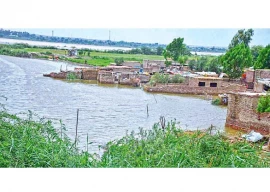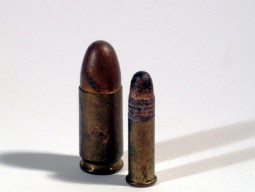
The number of dengue deaths in Sindh so far may be low compared to Lahore’s but the hospitals in Karachi are taking no risks and for better or worse are preparing with whatever resources they have. They insist, though, that there is no need to panic. So far, 550 cases have been reported, of which 442 are from Karachi — a city of 20 million people.
The Express Tribune conducted a small survey to see how ready these hospitals are for a possible outbreak of dengue, which is expected to hit mid-October and run through November, the breeding season for the deadly mosquito that causes the virus.
Jinnah Postgraduate Medical Centre (JPMC) has 15 beds set aside for patients infected with the vector-borne diseases. However, if the situation takes a turn for the worse, it can accommodate up to 200 patients in its wards. “Every medical unit can treat patients, hence we do not need a separate dengue cell,” said Medicine and Medical Intensive Care Unit Professor Dr Liaquat Ali. The doctor felt that, considering that Karachi has seen at least two or three epidemics, there is no reason to panic as doctors know how to deal with the situation.
A certain school of thought suggests giving infected patients mega platelets, which would mean hospitals should stock up. However, Ali disagreed. “It is not true that every infected person who bleeds requires platelets,” he said. “In some cases, even if the person’s platelets drop to 50,000 [the range is 150,000 to 400,000] and there is no excessive bleeding, I do not recommend administering platelets.” When the platelet count drops, the remaining cells become ‘hyperactive’ and work ten times as hard as compared to when they were within normal the range - usually over 50,000.
JPMC stores a couple of hundred bags of platelets in their blood bank as per routine. “Mega platelets have just become a big ‘tamasha’ [joke],” Ali said. “What is more important [than giving platelets] is ensuring that patient does not get re-infected and is kept safe from mosquitoes.”
For this, JPMC is slowly fumigating the entire campus - the last session was about a week ago. Mosquito netting for beds is available, windows are kept covered and mesh tears have been repaired. Doctors are advised to apply mosquito repellent while infected patients have been strictly advised to keep hydrated and rest. JPMC reports an average of eight cases a week which is very low compared to the 10 cases of malaria that come in daily.
At Civil Hospital, Karachi, where the Dengue Surveillance Cell (DSC) is located, a separate ward with a 10-bed capacity has been separated for dengue. “But if need be, we can extend this to a 100 or more beds across other wards,” said a DSC official. Civil hospital recently purchased 700 bags of platelets and has ordered another 700 in case of an emergency. It also has 3,500 diagnostic kits which help detect and confirm the presence of the virus in a patient’s bloodstream quickly. Meanwhile, daily fumigation is conducted between Asr and Maghrib.
In Orangi Town’s Qatar Hospital, 53 cases of dengue were reported from the start of the year till September 16. So far one patient was administered a single bag of mega platelets. The hospital’s focal person for dengue claims the staff is “thoroughly prepared for any outbreak.”
Four beds covered in nets in the corner of Qatar’s main ward serve as its dengue cell. The section is separated from the ward by a short wall and, according to the focal person, can be extended to accommodate 10 beds. The hospital has a cell separator to collect platelets if required and has 50 bags in store at present. However, the last time the entire hospital was fumigated was two weeks ago.
Abbasi Shaheed Hospital (ASH), meanwhile, has a separate ward with 40 beds, 20 each for men and women, for dengue patients. In case of an outbreak, another 30 beds can be added. ASH also has five isolation rooms and two beds in the intensive care unit replete with ventilators for serious patients.
The hospital does not, however, store mega platelets on the premises but has about 15 bags handy and owns a cell separator in case of an emergency. “We have a working relationship with the National Institute of Blood Diseases (NIBD) for blood and mega platelets,” explained ASH’s deputy medical superintendent Dr Jawaid Akhter. From August 15 to October 6, ASH admitted 175 dengue patients and there are 22 patients there right now. Six of them were brought in on Friday. The hospital is fumigated daily before Maghrib.
At the city’s biggest private hospital, Aga Khan University Hospital (AKUH), training sessions for house officers and residents have been held annually on the vector-borne disease. While AKUH does not have any beds or isolation wards dedicated to dengue, it does have a policy to deal with an outbreak, said Infection Control Committee Chairperson Dr Bushra Jamil.
If mega platelets or blood is required, the patient’s family is referred to blood banks. Rules of admittance also differ, depending on the doctor’s assessment. “If a person is suffering from dengue haemorrhagic fever, they are immediately admitted however if just the platelet count is low, even at 40,000 we do not admit them.”
Published in The Express Tribune, October 10th, 2011.




1725784957-0/Tribune-Pic-(17)1725784957-0-165x106.webp)












COMMENTS
Comments are moderated and generally will be posted if they are on-topic and not abusive.
For more information, please see our Comments FAQ